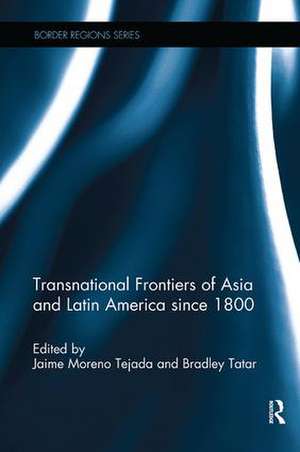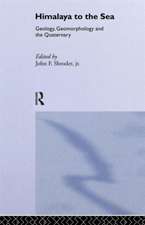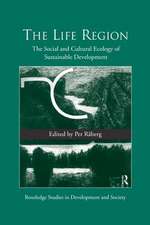Transnational Frontiers of Asia and Latin America since 1800: Border Regions Series
Editat de Jaime Moreno Tejada, Bradley Tataren Limba Engleză Paperback – 2 mai 2018
This book provides 16 different case studies of frontiers in Asia and Latin America by interdisciplinary scholars, charting the first steps toward a transnational and transcontinental history of social development in the borderlands of two continents. Transnationalism provides a shared focus for the contributions, drawing upon diverse theoretical perspectives to examine the place-making projects of nation states. Through the lenses of different scales and time frames, the contributors examine the social processes of frontier life, and how the frontiers have been created through the exertions of nation-states to control marginal or borderland peoples. The most significant cases of industrialization, resource extraction and colonization projects in Asia and Latin America are examined in this book reveal the incompleteness of frontiers as modernist spatial projects, but also their creativity - as sources of new social patterns, new human adaptations, and new cultural outlooks and ways of confronting power and privilege. The incompleteness of frontiers does not detract from their power to move ideas, peoples and practices across borders both territorial and conceptual.
In bringing together Asian and Latin American cases of frontier-making, this book points toward a comparativist and cosmopolitan approach in the study of statecraft and modernity. For scholars of Latin America and/or Asia, it brings together historical themes and geographic foci, providing studies accessible to researchers in anthropology, geography, history, politics, cultural studies and other fields of the human sciences.
| Toate formatele și edițiile | Preț | Express |
|---|---|---|
| Paperback (1) | 301.33 lei 6-8 săpt. | |
| Taylor & Francis – 2 mai 2018 | 301.33 lei 6-8 săpt. | |
| Hardback (1) | 821.53 lei 6-8 săpt. | |
| Taylor & Francis – 30 aug 2016 | 821.53 lei 6-8 săpt. |
Din seria Border Regions Series
-
 Preț: 348.51 lei
Preț: 348.51 lei - 14%
 Preț: 338.33 lei
Preț: 338.33 lei -
 Preț: 469.34 lei
Preț: 469.34 lei -
 Preț: 453.04 lei
Preț: 453.04 lei - 12%
 Preț: 298.61 lei
Preț: 298.61 lei - 12%
 Preț: 325.34 lei
Preț: 325.34 lei - 14%
 Preț: 299.06 lei
Preț: 299.06 lei -
 Preț: 436.14 lei
Preț: 436.14 lei - 14%
 Preț: 325.34 lei
Preț: 325.34 lei -
 Preț: 416.22 lei
Preț: 416.22 lei - 13%
 Preț: 305.32 lei
Preț: 305.32 lei - 13%
 Preț: 338.33 lei
Preț: 338.33 lei - 12%
 Preț: 325.34 lei
Preț: 325.34 lei - 16%
 Preț: 338.33 lei
Preț: 338.33 lei - 30%
 Preț: 768.30 lei
Preț: 768.30 lei - 31%
 Preț: 764.20 lei
Preț: 764.20 lei - 19%
 Preț: 258.89 lei
Preț: 258.89 lei -
 Preț: 389.66 lei
Preț: 389.66 lei -
 Preț: 385.71 lei
Preț: 385.71 lei -
 Preț: 386.77 lei
Preț: 386.77 lei - 19%
 Preț: 259.51 lei
Preț: 259.51 lei -
 Preț: 383.33 lei
Preț: 383.33 lei -
 Preț: 389.66 lei
Preț: 389.66 lei - 18%
 Preț: 943.31 lei
Preț: 943.31 lei
Preț: 301.33 lei
Preț vechi: 350.03 lei
-14% Nou
Puncte Express: 452
Preț estimativ în valută:
57.66€ • 61.66$ • 48.08£
57.66€ • 61.66$ • 48.08£
Carte tipărită la comandă
Livrare economică 17 aprilie-01 mai
Preluare comenzi: 021 569.72.76
Specificații
ISBN-13: 9781138601130
ISBN-10: 1138601136
Pagini: 290
Ilustrații: 36
Dimensiuni: 156 x 234 x 26 mm
Greutate: 0.54 kg
Ediția:1
Editura: Taylor & Francis
Colecția Routledge
Seria Border Regions Series
Locul publicării:Oxford, United Kingdom
ISBN-10: 1138601136
Pagini: 290
Ilustrații: 36
Dimensiuni: 156 x 234 x 26 mm
Greutate: 0.54 kg
Ediția:1
Editura: Taylor & Francis
Colecția Routledge
Seria Border Regions Series
Locul publicării:Oxford, United Kingdom
Cuprins
Introduction: Distance―Modern Transnational Frontiers
(Jaime Moreno Tejada)
PART 1: THEORIES
Chapter 1. Globalization and Changing Conceptions of Colombia’s Llanos Frontier since 1980
(Jane Rausch)
Chapter 2. Frontierization and Defrontierization: Reconceptualizing Frontier Frames
(Greg Acciaioli and Alka Sabharwal)
PART 2: EMPIRES
Chapter 3. Nation and Race in the Historical Juncture of the Haitian Revolution
(Dannelle Gutarra)
Chapter 4. Expanding the Japanese empire to the Manchurian frontier: immigration and ethnicity in the South Manchuria Railway towns
(Rosalia Avila-Tàpies)
PART 3: STATES
Chapter 5. Spatiality, Jurisdiction, and Sovereignty in Early Latin American Approaches to the Law of the Sea (Daniel S. Margolies)
Chapter 6. State Building and Problematic Geo-Political Spaces in South Asia: the Himalayas and the Extradition Treaty of 1855
(Alastair McClure)
PART 4: REGIONALISMS AND AGENCY
Chapter 7. Transnational Communities in the Yunnan Borderlands in the 19th and Early 20th Century: Re-thinking the Yunnan Borderlands and Frontier History Writing in China
(Diana Zhidan Duan)
Chapter 8. The Other Sides of the Frontier: Indigenous agency in the construction of borders in Southwest Amazonia
(Louise Cardoso de Mello)
PART 5: REPRESENTATIONS
Chapter 9. Walking with the Gods: The Himalayas as (dis)enchanted landscape
(Christopher A. Howard)
Chapter 10. Constructing and Celebrating a National Object of Desire: The Amazonian Oriente Frontier and Ecuadorian Society, 1900-1946
(William Fischer)
PART 6: ETHNOGRAPHIES
Chapter 11. Frontier Bali: Local Scales and Levels of Global Processes
(Graeme MacRae)
Chapter 12. An Ambivalent Nation: Ch'orti' in Eastern Guatemala and Western Honduras
(Brent Metz)
PART 7: ENTANGLED HISTORIES
Chapter 13. Nation-State Building and Transnationalism: Central American Connected Histories
(Luis Roniger)
Chapter 14. Infrastructuring the Mekong: Construction of the National Border and Riverbank Development in Vientiane Capital, Lao PDR
(Miki Namba)
PART 8: DIASPORAS
Chapter 15. The Frontier of Belonging: Repatriation and Citizenship of the Overseas Chinese in Colonial Malaya (Low Choo Chin)
Chapter 16. James Tigner and the Okinawan Emigration Program to Latin America
(Pedro Iacobelli D)
(Jaime Moreno Tejada)
PART 1: THEORIES
Chapter 1. Globalization and Changing Conceptions of Colombia’s Llanos Frontier since 1980
(Jane Rausch)
Chapter 2. Frontierization and Defrontierization: Reconceptualizing Frontier Frames
(Greg Acciaioli and Alka Sabharwal)
PART 2: EMPIRES
Chapter 3. Nation and Race in the Historical Juncture of the Haitian Revolution
(Dannelle Gutarra)
Chapter 4. Expanding the Japanese empire to the Manchurian frontier: immigration and ethnicity in the South Manchuria Railway towns
(Rosalia Avila-Tàpies)
PART 3: STATES
Chapter 5. Spatiality, Jurisdiction, and Sovereignty in Early Latin American Approaches to the Law of the Sea (Daniel S. Margolies)
Chapter 6. State Building and Problematic Geo-Political Spaces in South Asia: the Himalayas and the Extradition Treaty of 1855
(Alastair McClure)
PART 4: REGIONALISMS AND AGENCY
Chapter 7. Transnational Communities in the Yunnan Borderlands in the 19th and Early 20th Century: Re-thinking the Yunnan Borderlands and Frontier History Writing in China
(Diana Zhidan Duan)
Chapter 8. The Other Sides of the Frontier: Indigenous agency in the construction of borders in Southwest Amazonia
(Louise Cardoso de Mello)
PART 5: REPRESENTATIONS
Chapter 9. Walking with the Gods: The Himalayas as (dis)enchanted landscape
(Christopher A. Howard)
Chapter 10. Constructing and Celebrating a National Object of Desire: The Amazonian Oriente Frontier and Ecuadorian Society, 1900-1946
(William Fischer)
PART 6: ETHNOGRAPHIES
Chapter 11. Frontier Bali: Local Scales and Levels of Global Processes
(Graeme MacRae)
Chapter 12. An Ambivalent Nation: Ch'orti' in Eastern Guatemala and Western Honduras
(Brent Metz)
PART 7: ENTANGLED HISTORIES
Chapter 13. Nation-State Building and Transnationalism: Central American Connected Histories
(Luis Roniger)
Chapter 14. Infrastructuring the Mekong: Construction of the National Border and Riverbank Development in Vientiane Capital, Lao PDR
(Miki Namba)
PART 8: DIASPORAS
Chapter 15. The Frontier of Belonging: Repatriation and Citizenship of the Overseas Chinese in Colonial Malaya (Low Choo Chin)
Chapter 16. James Tigner and the Okinawan Emigration Program to Latin America
(Pedro Iacobelli D)
Notă biografică
Jaime Moreno Tejada is a historical geographer based at Chulalongkorn University, Thailand.
Bradley Tatar is a cultural anthropologist based at UNIST, Ulsan, Korea.
Bradley Tatar is a cultural anthropologist based at UNIST, Ulsan, Korea.
Descriere
Frontier history remains staunchly traditional, still sheltered under the powerful wings of 19th century historian and founder of the discipline, Frederick Jackson Turner. But things are changing, partly thanks to the rise of transnational history and interdisciplinary research. This book shows the emergence of pathways for investigation in various academic fields which are both innovative and faithful to the well-established framework of frontier studies. There is a long tradition of borderlands research in both Asia and Latin America, but thus far there has been very little contact between these two strains of scholarly literature. The volume builds a bridge between Asia and Latin America, and opens up the field for conversation and collaboration.









